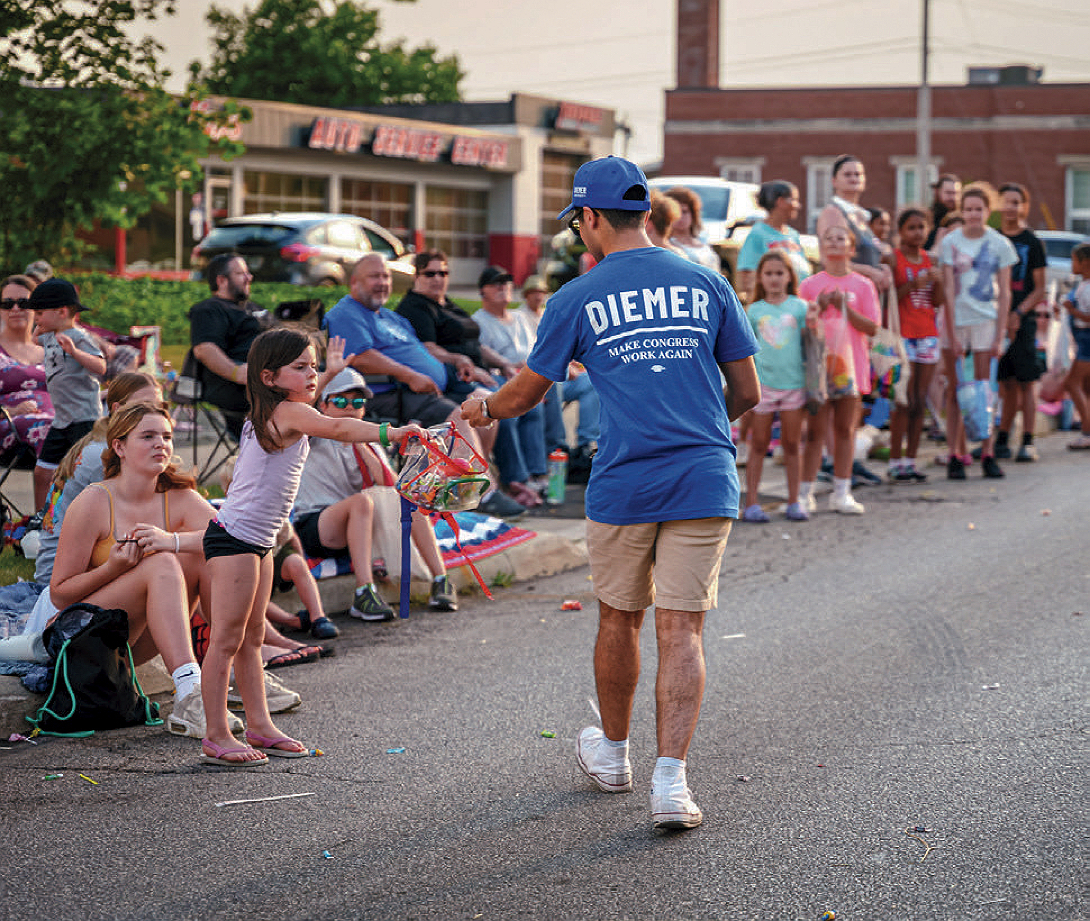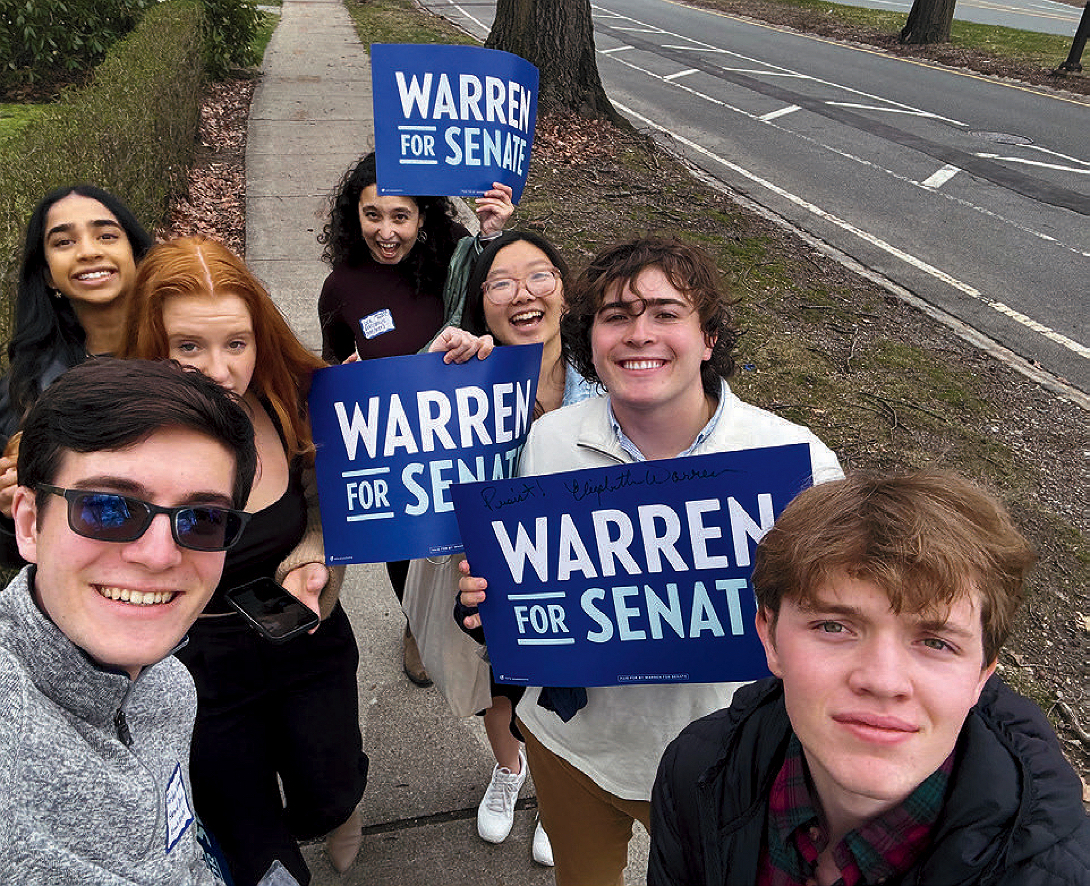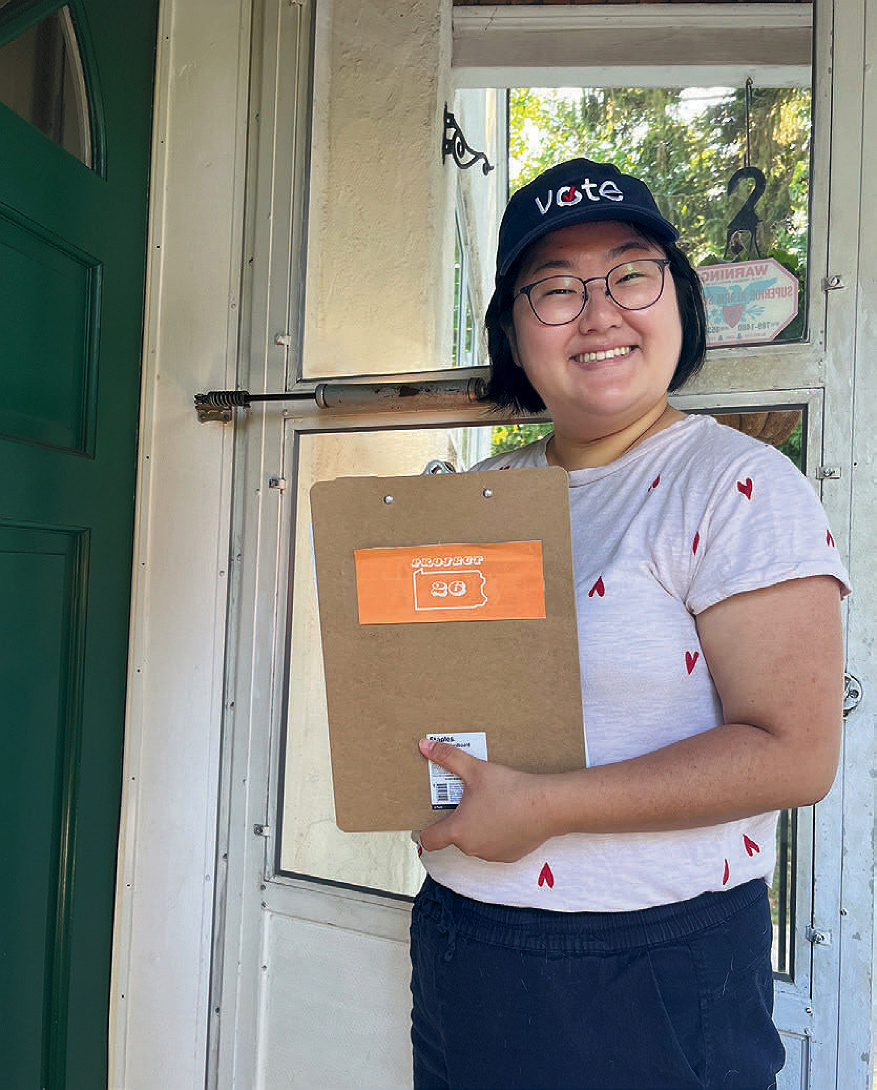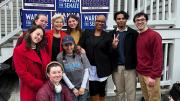On the evening of November 5, as Harvard students gather to watch election results, some undergraduates will be more nervous than others. For them, the numbers will shape their communities’ and country’s political future—and will also determine whether their internships were successful. This summer and fall, dozens of Harvard students campaigned for local, state, and national candidates.
Student participation in political campaigns has a long history. In 1968, notes professor of government Ryan Enos, undergraduates “went clean for Eugene,” campaigning for Democratic presidential aspirant Eugene McCarthy. Thompson professor of government Stephen Ansolabehere recalls some of his Ph.D. colleagues driving to New Hampshire in the ’80s to knock on doors before presidential primaries.
Today, some students arrive in Cambridge already passionate about campaigning. Matan Josephy ’27 grew up in a politically aware household but fully embraced the political “junkie lifestyle” as a high school freshman. During a 2020 Democratic primary debate for the open Congressional seat in Massachusetts’s fourth district, encompassing his Newton home, one candidate mentioned his internship program. “I was so into following all these races,” says Josephy, but “I had no idea that students can be involved in them.” Remote work during the pandemic allowed him to intern on three Congressional campaigns during the summer and fall of 2020 “in” Georgia, Massachusetts, and New Jersey.
Matriculating at the College in 2023, Josephy wanted to learn more, so he joined the Campaign Advocacy Program (CAP) at the Harvard Kennedy School’s Institute of Politics. Each week, some 20 undergraduates gather to hear from political experts; the guests range from pollsters and campaign managers to elected officials and failed candidates.
Nuriel Vera-DeGraff ’26, who joined CAP during his first undergraduate year, now leads the group. After focusing on local politics this spring, CAP will spend the fall analyzing the presidential campaign. “The dream is…to have one Democrat and one Republican” as a guest “at each meeting,” he says. “The goal would be to have a respectful, engaged, and informed conversation about what strategies campaign-wise each of the candidates are using.” This summer has served as a crash course in campaign volatility; many of the topics Vera-DeGraff assumed the group would discuss became moot by mid-July.
Each student campaign worker has his own set of motivations. Some, for example, are driven by ideals. Having staffed two Cambridge city council elections during high school, this summer Vera-DeGraff served as community organizing director for U.S. Representative Ayanna Pressley’s (D-Massachusetts) campaign, whose politically progressive views he shares. In April, right before starting the internship, the math and social studies double concentrator spent a week sleeping in the Harvard Yard pro-Palestine encampment (for which he was placed on academic probation). By working for Pressley, he says his activism could continue, albeit in a “new kind of role.” “I am extremely happy that I’m working for a candidate who believes in a free Palestine, is pro-ceasefire, anti-genocide.” He continues, “I can’t imagine working for anyone who doesn’t have a certain base level of shared values.”

a Wadsworth, Ohio, parade | PHOTOGRAPH COURTESY OF DEv AHUJA
Some students appreciate that campaigning gives them a chance to interact with citizens who hold dissimilar values. Dev Ahuja ’27, a government and economics double concentrator from Solon, Ohio, worked for Matthew Diemer’s congressional campaign. Though much of the seventh district is made up of small, conservative cities in central Ohio, some left-leaning Cleveland suburbs (including Ahuja’s) have been “siphoned off” into the district, he says. Traveling 50 miles south revealed a side of Ohio very different from the one where Ahuja grew up. During his second week on the campaign, for which he helped coordinate fundraising and publicity, he attended a parade in Wadsworth, Ohio, a suburb of Akron. “There was a three-year-old on the street chanting, ‘Let’s go Brandon,’” an anti-Biden phrase. He continued, “You would never see that in Solon.” Leaving the Cleveland (and Harvard) bubble, Ahuja aimed to get a sense of the true range of American politics.
On campus, Ahuja is a member of the Harvard Democrats. Unlike most collegiate Democrat chapters, says co-president Victor Flores ’25, this branch endorses a slate of candidates each election cycle. Though an endorsement from the club might not directly earn a candidate many votes, it could yield hundreds of hours of volunteer labor. The group organized a phone-banking session for Sabrina Bousbar (running in Florida’s thirteenth district), knocked on doors for former Gottlieb professor of law Elizabeth Warren, now a U.S. Senator, and helped students secure internships with Rep. Pressley, says Harvard Democrats campaign director Dominick Lombard ’27, who worked on a Rhode Island state senator’s reelection campaign this summer.

The Harvard Democrats meld politics and socialization. While phone-banking from their classic meeting spot of Boylston 104, members share tidbits of conversations that they had with random voters. “When someone talks about a specific policy issue, they may have framed it in a funny way,” says Flores, “but we take it seriously.”
For some students, the process of voting itself is the most riveting part of the election cycle. When June Park ’24 was in high school, she didn’t know how to register to vote. The daughter of Korean immigrants, she set up a voter drive at her high school. That interest in the civic process continued at the College, where she ran the 2022 Harvard Votes challenge and wrote a 105-page government thesis analyzing the impact of high school voter-registration drives on youth voter turnout.

After graduation, Park began work for Project 26 Pennsylvania, a nonprofit that helps young people register to vote. Though the Havertown, Pennsylvania, native has staffed Democratic campaigns in the past, she is now more interested in promoting voting generally rather than advocating for certain candidates or ideologies. “I think it is my moral duty to help someone vote, because it’s not easy to vote in the United States,” she says, continuing, “I’ve run into a bunch of conservative folks and still help them register to vote and make a plan to vote because that’s the right thing to do.”
On election night, these students will be looking for different results. For students whose incumbent candidates are running unopposed, it will be a night to celebrate the past term and look forward to the next. For contested elections, it will be a tense evening (Josephy, who staffed those three 2020 campaigns, went to bed at 10:00 P.M. to minimize his anxiety). For get-out-the-vote staffers, turnout results may take longer to calculate. Although these students seem to enjoy their work, some can’t help but eye the finish line. “I’m looking forward to it being over,” said Lombard, “with favorable results.”








